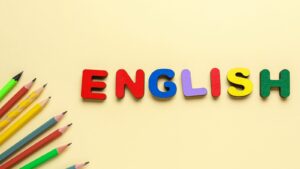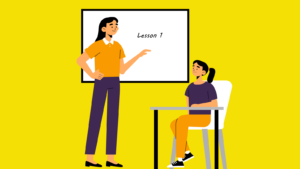by Rachel Boyce
In 2017 there was one new phrase that I kept hearing, from students, on TV and social media.
My bad
The Urban Dictionary lists this as a form of slang, to admit an error, or apologise for a mistake. I understood. The meaning was always clear but my ears cringed at hearing it spoken out loud.
Surprisingly, the frequency of the word is listed as being in decline, but since I have only just this year come across it, and for me the frequency seems to be on the up, I would certainly question the data. Further online research seems to suggest that it is derived from street slang used in American black neighbourhoods that has now made its way into mainstream language.
However, the origin is not of importance here. My focus is to express my reaction when I first had a student use this phrase with me, which was actually before I had heard it anywhere else. It was on a ‘student-only’ English group that I run on social media.
One particular student, who has C1 level English having passed the CAE exam with me the year previously, made a typo error in a post, that I corrected, to which he replied ‘my bad’.
I responded to this by asking if he really meant ‘my mistake / my error’ adding ‘that can’t also be a typo!’ As you can see, I thought something odd was afoot and didn’t want to (a) make myself look stupid in not knowing what this was, since I recognise only too well that I am getting older and more out-of-touch with the frills and fancies of the young, or (b) offend the lad in a public place. However, I did want to correct him!
The conversation ensued, with other students diving in. One noted that they thought they could only use ‘error’ when they were talking about a problem with technology. Being born to a time before computers, mobile phones and the internet at home I certainly smiled at that one! (Although I am only 47, not 90!)
So what’s wrong with “my bad”?
The students asked ‘What’s wrong with the expression “my bad”?’ I had to think! I knew what it meant instinctively but it sounded wrong. So I started by analysing it. Subject pronoun and adjective. Urgh! Would you say ‘our happy’, ‘his good’, ‘their wrong’? No. It seemed obvious. You need a noun not an adjective here. Hence ‘my mistake / error / fault’ sounded correct.
However, the conversation couldn’t be as simple as that.I know only too well from studying English that language is a beast that is constantly changing with over 4000 new words and expressions a year coming into use, as well as a plethora of others being lost to the sands of time. Was this another example, as noted by David Crystal? Or was it something coming from ELF – English as a Lingua Franca – into the prevailing language sphere, where errors are actually being noted as a correct and new form of the English language, as an intercultural means of communication recognised more for its acceptance of forms that would not be freely used within native-speaker norms, a domain of influence championed by Jennifer Jenkins?
So…. back to the conversation… my response to the student was:
‘It’s not right! It’s an awful example of ‘Trump’ style Americanism that is so wrong it makes my British English ears bleed. Don’t do it!’
Do you think I expressed myself strongly enough? I know. It was a bit over the top and I cringe about it now. Yet my intentions were good, and in essence I still feel the same.
Since then I have heard the phrase numerous times, and specifically it sounded wrong in one TV series, namely Billions. In contrast, I did not hear it in another prominent TV series that I was watching at the same time as these two, namely Stranger Things.
The language of my past.
So, I thought about this some more. Stranger Things was a perfect TV series for me. I loved the idea, the acting, the deeper complexity of the storyline and characters within. What I didn’t realise until later on, and after the ‘my bad’ experience, as that the reason I felt so comfortable with it was that it was set in 1984. In 1984 I would have been the same age as those kids who were racing around on their bikes after school. There were no computers, no mobile phones. It all felt comfortable to me: the clothes, the era, the food and…. the language!
When does slang become mainstream?
Jump now to Billions. Ok I am not a billionaire so there was no comparison whatsoever there, but the era was now. I could connect to the office lifestyle, the current constant need for mental health analysis, the fashion and the technology. Yet, I could not get used to the language.
I heard the phrase ‘my bad’ more than once. One time in particular stuck in my mind as it seemed and sounded so wrong! It was a scene in series 2, where Chuck has a photo opportunity while playing ball with his son, as he is about to announce his intention to run for political office. Whilst throwing the ball, he delivers one that his son finds difficult to catch. At this point he shouts, ‘My bad’. It sounded so wrong.
This character, in my mind, should not, and almost definitely would not, be using language like this with his son. He is meant to be a vastly intelligent lawyer, leading the fight against financial corruption as a powerful, insightful and astute prosecutor. He is highly educated, calculated, with abundance of professionalism, from a family with a long history in prestigious schooling and social standing. Why would he be using slang with his son? He wouldn’t. He would only want to give the very best impression, including a lack of slang, one would have thought.
This guys swears. I am not talking about swearing. Swearing may be ‘bad’ but it is usually grammatically correct. It is the grammatical incorrectness that I object to and cannot accept that this character would accept either, let alone ‘teach’ it to his son!
Are we entering the era of new English that just doesn’t sound right? Am I being prudish? Are there others out there that find ‘my bad’ as something that sounds wrong? What about ‘bigly’ as brought into the limelight by Donald Trump, a president who is becoming synonymous with a lack of grammatical flair, accuracy or even eloquence. I would have hoped that people of importance like that would be beacons of higher standards in this world, and maybe they were before, but not now. I am dismayed, and now I sound like my grandparents.
Surprisingly, after recently watching ‘West Wing’ again for the umpteenth time I found not one but two occasions where Josh says ‘my bad’ yet I had never noticed it before, and I have seriously watched this series many many times. Does this mean as I am getting older I am actually becoming more of a grammar and vocabulary nerd? Or, am I just overly sensitive right now to this specific phrase? I don’t think I will ever find the answer.
The discussion on English Language & Usage notes ‘It’s proper English slang [but] I wouldn’t go so far as to say it was proper English. It will certainly be effective in irking English teachers, haters of textspeak, and other grammar purists!’
One size fits all?
So am I really a language purist? I would say that is a little broad in definition. I want things to be correct but there is also the matter of being polite, using correct English in relation to context, or as Brian Cox would say, within a certain frame of reference.
What do I mean?
Well, as an English teacher I have to embrace new vocabulary, even if it goes against my personal preference as I get older. I accept that. I do however want to make sure that the learners of today, as they acquire English, don’t take on the ‘one size fits all approach.’ I also want to teach my students that as you communicate you must consider a variety of influences on your choice of vocabulary, phrases and expression, for example:
- Context – is this a formal or informal context?
- Respect – do you want to show respect to the person you are speaking to?
- Numbers – are you talking to one person or a group of people?
- Importance – is what you want to say something for everyday conversation or is it an important point that you want to express?
The list can go on, including time of day, outdoors or indoors, public or private, confidential or open, mood, tone and volume etc.
Speaking is communication, but it is also painting a picture with words. There are times when an order or instruction is sufficient and others when a masterpiece of articulation can amaze and impress.Your words present you as much as your appearance.
Take care, pay attention, and especially before you speak to me, choose wisely if you really want to accept ‘my bad’ into your vocabulary!
Urban Dictionary: https://www.urbandictionary.com/define.php?term=My%20bad
English Language & Usage: https://english.stackexchange.com/questions/5264/is-my-bad-a-correct-english-phrase
West Wing, 1999-2006, NBC (USA)
Billions, 2016 – , Showtime (USA)
Stranger Things, 2016 – , Netflix (USA)




